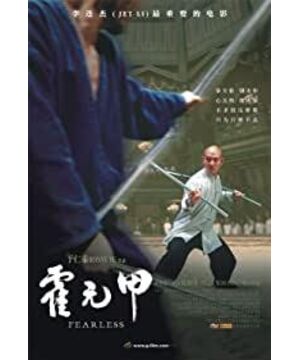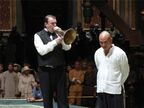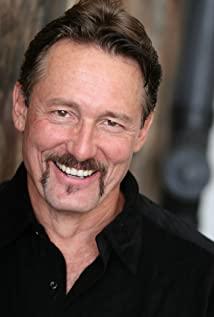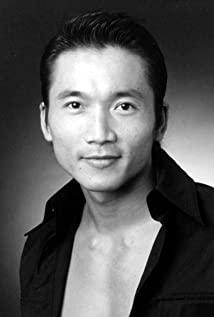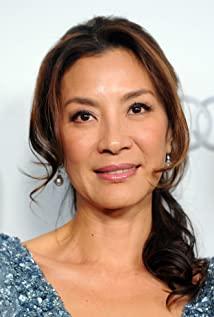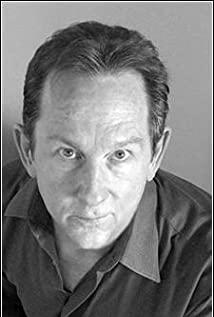It is the highest state of Chinese martial arts. "Huo Yuanjia" is a movie that interprets "the benevolent is invincible". In the first half of the film, it is a young and frivolous Huo Yuanjia who is very happy. Confused and confused, I don't know if there is clear frost in heaven and earth. In order to fight for "the number one in Tianjin", he punched in the north and south, kicked in all directions, and just fought hard. He knocked down the invincible Master Zhao in Jiangnan, beat the swarms of challengers into a maim, and beat the famous Qin Ye from his birthday to the day of his death. The shot is heavy, the foot is ruthless, and the potential is the same as that of a beast. The way of heaven is always, this stubborn "big hero" who is self-indulgent, indiscriminately formed friends, spends money like soil, can't bear the temper of the moment, regardless of right and wrong, and the "big hero" who is brave enough to fight for himself eventually also played the end of the separation of his friends and the ruin of his family. In the middle part of the film, there is a lost and helpless Huo Yuanjia. If you have regrets in this life, you will know how much you are ashamed of your past. He wandered aimlessly in all directions, fell into a foreign land and was rescued by farmers. The blind woman can see the world more clearly than the flamboyant "hero". She understands that her heart is like an external body and must be cleaned from time to time in order to live a refreshing life. The elderly mother-in-law understands the psychological pain better than the good doctor of the world. She knows that only labor is the panacea for decadence. Huo Yuanjia understood the true meaning of martial arts in the vast field where dragonflies flew over and village children ran across, in the muddy paddy fields where the mountain wind blew and the farmers stepped on, and on the farm table where the spring was washed and laughter drifted over. Out of the low point of life. In the second half of the film, it is a Huo Yuanjia who is indifferent and caring for the world. Although the past has passed, the coming can still be followed. He burned the life and death records that recorded his "great achievements" and deeply repented at the tomb of his relatives. He defeated the American Hercules with the power of "four ounces and a thousand pounds", and saved his opponents in distress with the sportsmanship of "meeting friends by force". He founded the Jingwu Gymnastics Association, advocated martial arts, inspired the Chinese people to strive for self-improvement, and spread martial arts to the world as a sports that inspired the Chinese people's aspirations. At the last moment of his life, he defeated his opponents and himself with the spiritual realm of "benevolence is invincible", and achieved a great "martial spirit", which was admired by the father of the country and admired by the people. Needless to say, narratively speaking, this is a very old-school movie. The narrative method combining positive narrative and flashback is quite satisfactory. Symmetrical structure, clear veins, steady and steady, step by step, simple and direct to the final theme. But in terms of plot and allegory, the movie has a lot to offer. First of all, the film has a subversive creation in the plot setting of the protagonist's frustration. Generally speaking, this kind of plot is generally set up as a brave and ruthless protagonist who encounters a real master and suffers a crushing defeat. Finally, he will be overcome with pain, wash away his hostility, and start a new life. In this film, on the contrary, Huo Yuanjia not only did not There was a formal defeat, but instead a "great victory", not only knocked the opponent to the ground, but also hit the western sky. Then he turned his pen to show his essential fiasco with the unexpected result of his opponent's adopted son killing Huo Yuanjia's family. This produces a kind of breathtaking shock, which has made an excellent foreshadowing for the development of the following plots. Of course, the controversy of this plot is also obvious, which will be mentioned later. Second, when showing Huo Yuanjia's youth and frivolity, the film set up a great environment for him to be watched and praised by everyone, and he took the trouble to let a mad beggar sing praises for him. In the description of Huo Yuanjia when he woke up and returned to his hometown, only the beggar was left to continue to praise him, while the rest of the people had gone the same way. The two plots echo each other, are cleverly conceived, have profound implications, and vividly express the frail nature of a "powerful" "conqueror by force". Third, there is a famous saying by Jiang Nanhe in "Crouching Tiger, Hidden Dragon": if you hold your hand tightly, there is nothing in it; if you let go of your hand, you will get everything! In the first half of the film, Huo Yuanjia clenched his fists and brought only the death, injury and disability of his opponent, and his own family was destroyed. In the second half of the film, when Huo Yuanjia released his fist, he won the respect of his opponent and the love of the people. This is a profound interpretation of Jiangnan He's famous saying, and a profound interpretation of "the benevolent is invincible". This is the essence of the whole film. Fourth, the focus of this film is also in its respect for tradition. In the 1980s, the arena was all the rage in the mainland, and its representative works include "Wulin Zhi", "Wudang" and "New Fang Shiyu". The interesting thing is that the arena in these movies almost appeared in "Huo Yuanjia", the Russian strongman in "Wulin Zhi" is similar to the American strongman, the Japanese ronin in "Wudang" and the one who finally faced off with Huo Yuanjia. Similar to Japanese martial artists, Lei Tiger in "New Fang Shiyu" is similar to Master Zhao on the high platform. The only difference is that there are no computer stunts in these films. It can be seen that as long as the old bottle is replaced with new wine, the effect is obvious to all. Of course, the film's flaws are also obvious. The first is that the lines are too straightforward and too preachy, such as the proverbs spoken by Huo's mother's godson and the blind girl when she washed Huo Yuanjia's hair, etc. Furthermore, the part of Huo Yuanjia being rescued after being lost was handled too suddenly and lacked the necessary foreshadowing. But in general, these little glitches in commercial action films generally don't attract the attention of producers, who pay the most attention to the effect of the fight. Now I want to talk about the creative theme of the film. The author believes that the theme of "Huo Yuanjia" is not so much the memory of national heroes, but rather the review of Jet Li's mental journey. It can even be said that it is a discussion of the mental journey of many successful people who are highly admired by the public. Therefore, the hero in the movie has turned the tide, returned with beauty, and lived in the world with both fame and sex. The author thinks that this is the beginning of Jet Li's consciousness and the real progress of his thought. What happened to the real hero, what he encountered was the scars all over his body, the lonely long distance, the real sense of insignificance, and the inner demons that became more and more difficult to overcome. Therefore, I express 120,000 respect for Jet Li's profound self-reflection in the film. However, this movie was created based on the true prototype of Huo Yuanjia. In the film, arranging the tragic death of his family because of his deeds will damage Huo Yuanjia's original hero image in the eyes of the people. More importantly, how will Huo Yuanjia's descendants feel after watching this movie? This topic is too sensitive and heavy, so stop here! Now let’s talk about your favorite action scenes. Compared with the realism of the hard bridge and iron horse in "Shaolin Temple" and the freehand brushwork of "Swordsman", the action of "Huo Yuanjia" is more similar to that of "Huang". Feihong" and "Fighting Heroes". But to be more precise, it is more virtual than "Heroes of Heroes" and more real than "Once Upon a Time". Compared with the specific action details, I personally appreciate the strong contrast between the fierce and aggressive style shown in the first half of the film and the modesty and style shown in the second half, because the changes in the characters' spiritual realm can be clearly seen from this. Of course, in terms of direct viewing, the former is stronger than the latter, so that some people think that the climax of the film is premature. I think that's where the movie deserves a closer look. Before the transformation, the protagonist was heavy-handed and light-hearted, and his movements were extremely publicized. The transformed protagonist intends to take shape first, and to guide the shape with his intentions, he must be carefully observed. I believe this is also what the film wants to explain to the audience about the realm difference of Chinese martial arts. Explained in philosophical language, the external movement changes reflect the leap in the character's inner nature. When it comes to the topic of martial arts realm, I would like to talk about the discussion of other films on this issue. Coincidentally, in fact, a puppet cartoon many years ago had made a very perfect interpretation of this. The protagonist of this cartoon titled "Shoot Without Shooting" is a famous archer, who studied hard when he was young, and achieved success. But he also had evil spirits, trying to kill his master, and after being instructed by an expert, he was able to achieve a positive result. However, the Confucian thought of joining the WTO expressed in "Huo Yuanjia" is different, and "Shoot Without Shooting" is more inclined to Lao Zhuang. At the end of the film, the aged archer has no idea what a bow is, and has truly reached the realm of inaction and inaction. Finally, I can't help but review Jet Li's past. If "Shaolin Temple" is Jet Li's green age, and "A Man Becoming Self-improvement" is Jet Li's youthful time, then "Huo Yuanjia" is Jet Li's golden years. The promotional page of Jiang Yuheng's record "Map" once wrote: 20-year-old map is drawn on paper, innocent and romantic; 30-year-old map is written on the hand, indulgent and unrestrained; 40-year-old map is engraved on the face, confident And open-minded. Looking at Jet Li's film career from this point of view, we might as well say this: at the age of 20, kung fu was physical, vigorous and lively; at the age of 30, kung fu was passed down to the gods, calm and free and easy; at the age of 40, kung fu was focused on the mind, deep and lively. Magnificent. The tide comes from the tide, and the flowers bloom without the flowers falling. It is impossible for a person to stand on the top of the world forever. Jackie Chan climbed to the heights of "Who Am I" and then slowly grew old in his world of action comedy. Jet Li is also inevitable. Perhaps, "Huo Yuanjia" is the last peak of its traditional martial arts world. Thinking about it like this, it's hard to avoid melancholy. But this is the law of nature and the fate of mankind. Personnel are metabolized, and exchanges become ancient and modern. Those of time, passers-by of a hundred generations. old, what more It is Cheng Li. When the tide goes, the tide will come, and the flowers will fall and the flowers will bloom. There are talented people in the country, each leading the way for decades. Chinese martial arts must have successors, and Chinese martial arts movies will have a better tomorrow. On January 27, 2006, the pony was in Yiliang soup pool
View more about Fearless reviews


